Yielding to aggressive U.S. policy, the European Union signed a deal with the United States which allows U.S. farmers to sell more beef to Europe and will lead to a meat surplus in the European market.
FRANKFURT, Aug. 15 (Xinhua) -- For Belgian farmer Philippe Saudoyez, who rears 500 cattle, taking care of the popular beef breed Belgian Blue is a skilled job.
But the pride in his job is fading due to higher production costs and flat farm gate prices, which are squeezing his already lean profits, and on top of them -- a new deal signed on Aug. 2 between the United States and the European Union (EU) that allows U.S. farmers to sell more beef to Europe.
Over the next seven years, more than 77 percent of non-hormone treated beef imports to the EU, valued at about 420 million U.S. dollars, will be allocated to the United States.
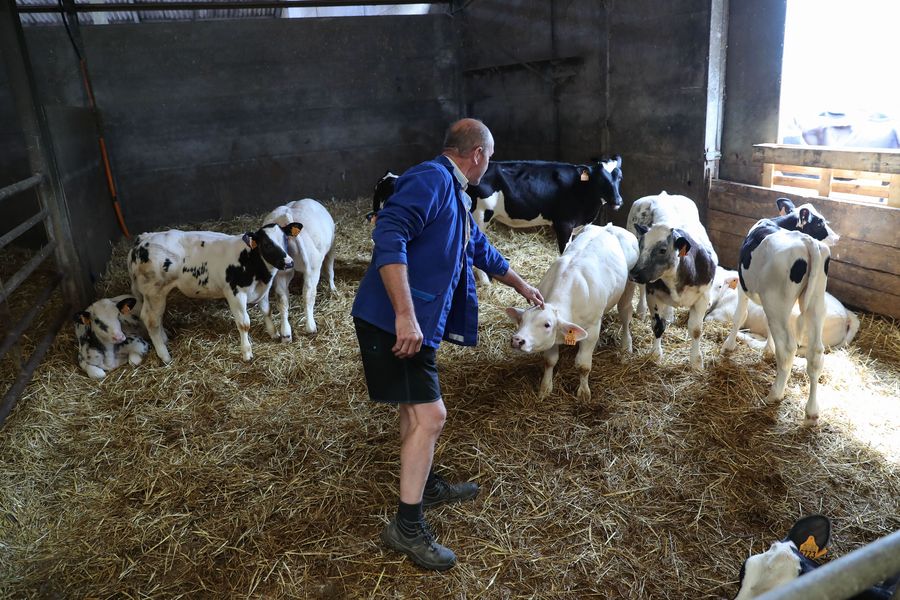
Belgian farmer Philippe Saudoyez takes care of Belgian Blue cattle at his farm in Merbes-Sainte-Marie, Belgium's Hainaut province, Aug. 12, 2019. (Xinhua/Zhang Cheng)
Saudoyez, whose business lost 150,000 euros (around 167,179 dollars) in the past three years, believed the deal will lead to a meat surplus in the market, as beef is already competing with other meats, and small farms will be forced out.
"For us, our only right is to shut our mouths and pay the bill. If you do not like it, then you must clear out. It's really a dictatorship," he said.
COSTLY BEEF TRADE DEAL
The EU and the United States have been stuck in an impasse on reaching a trade agreement that would cut tariffs on industrial goods.
Amid a fight over subsidies to their respective aerospace companies, Boeing and Airbus, U.S. tariff threat on European car imports, and U.S. tariffs on European steel and aluminum, the prospect of reaching such an agreement remains slim in the short term, analysts said.
Therefore, for many, the latest beef trade deal between the two sides, which still needs formal approval from the European Parliament, has become symbolically important.
"It is not yet the 'big deal,' but an important pragmatic step away from the trade war!" German Minister for Economic Affairs and Energy Peter Altmaier tweeted after the announcement of the deal.
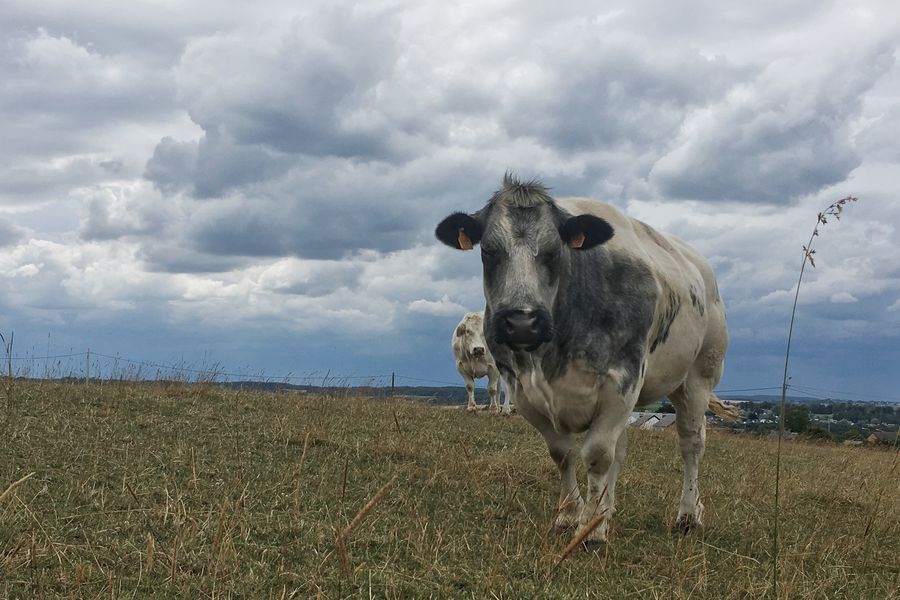
Cattle are seen at a farm near Waterloo in Belgium, July 20, 2019. (Xinhua/Zheng Huansong)
Prior to this deal, the EU has ratcheted up sourcing American products to ease the trade tensions.
Following a July 2018 meeting between U.S. President Donald Trump and outgoing European Commission President Jean-Claude Juncker, the EU has increased its imports of liquefied natural gas from the United States by over 367 percent. EU imports of U.S. soybeans also doubled in the period from July 2018 to June 2019, compared to the number from July 2017 to June 2018.
At a background briefing in late July, an EU official told Xinhua that the bloc's shopping spree was not "appeasing" the United States, but in the economic interest of the EU.
With a new beef trade deal, "the EU has once again shown its good will to end longstanding trade disputes such as those over beef imports," said Ulrich Ackermann, foreign trade manager of the German Mechanical Engineering Industry Association.
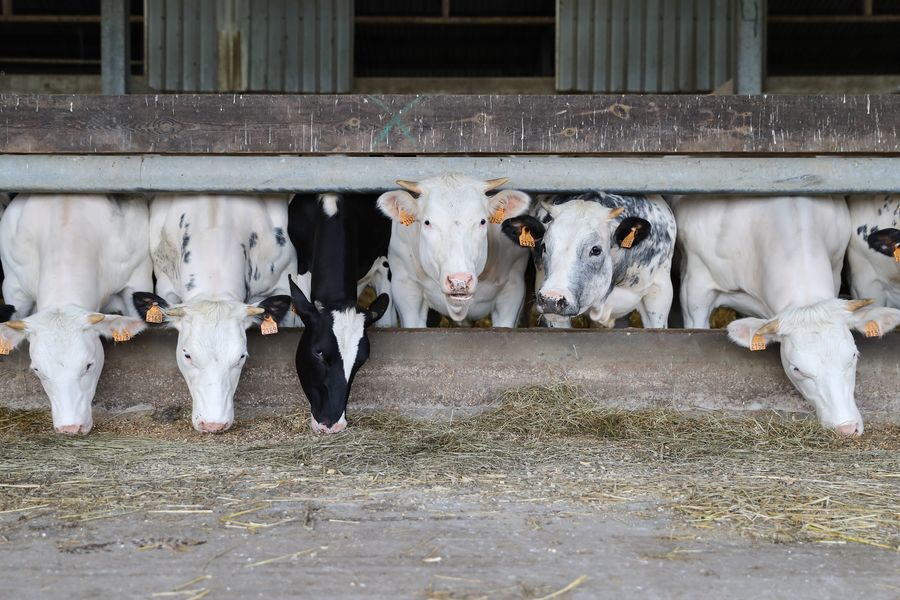
Belgian Blue cattle are seen at Philippe Saudoyez's farm in Merbes-Sainte-Marie, Belgium's Hainaut province, Aug. 12, 2019. (Xinhua/Zhang Cheng)
Yet for Saudoyez and his fellow cattle farmers, a breathing space for the embattled manufacturing sector created by the latest deal would be quite costly, and the big picture is still dim.
"For future generations, I do not see how they will cope," Saudoyez said.
HARD LIFE FOR FARMERS
At a press conference on the signing of the deal, Trump proudly took it as "a tremendous victory for American farmers, ranchers and, of course, European consumers." Yet, European farmers like Saudoyez have been left out of the picture.
As perhaps the weakest agent in the food production chain and under constant pressure from processors and retailers, European beef farmers have long been complaining of not getting properly paid.
Micheal Thornton, a 43-year-old Irish beef farmer, said he has become a part-time driver as his income from the cattle farming failed to support his family.
"Ten years ago, one kg of beef was sold for about 5.2 euros, now it is only around 3.6 euros, almost a 30-percent drop, making cattle farming a hard business to do," he said.
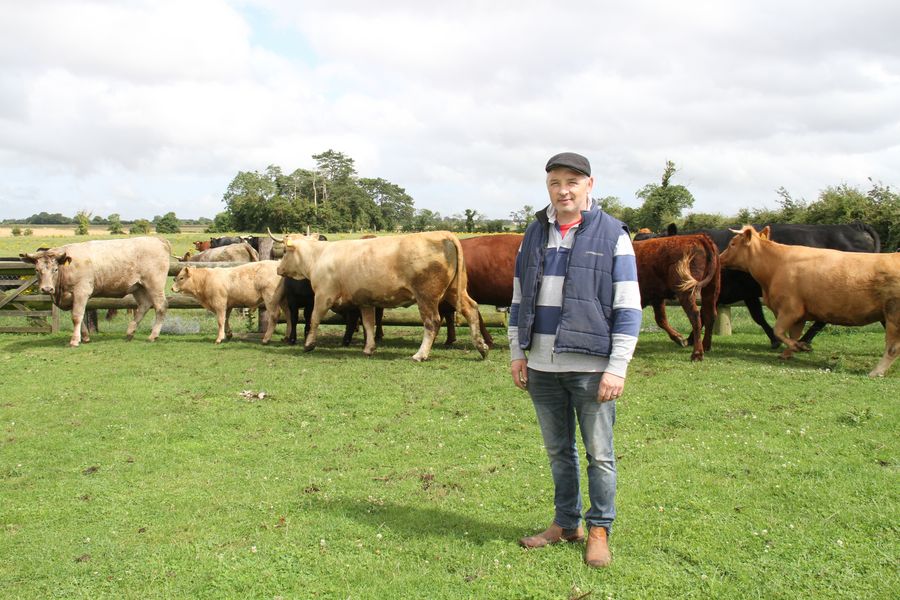
Micheal Thornton, a 43-year-old Irish beef farmer, stands in his family farm in Clonee Village of County Meath, Ireland, Aug. 9, 2019. (Xinhua/Zhao Tianyu)
In Ireland, one of the world's largest beef exporters, newly-formed Irish beef farmers' body Beef Plan Movement has launched a nationwide protest over the past two weeks to get better prices for their beef.
Eamon Corley, leader of the movement and a beef farmer himself, told Xinhua that the latest EU-U.S. deal, plus a previously announced EU-Mercosur deal, will depress the prices even further and make the situation even worse for beef farmers.
The EU-Mercosur trade agreement was politically agreed between the EU and five South American countries at the end of June to allow the latter to annually export 99,000 tons of their beef to the EU market.
The possible influx of imported beef to an already saturated EU market also worries farmers in Poland, another top beef exporter in the EU.
Krzysztof Tolwinski, president of the Federation of Family Farms and former Polish parliament member, said there are about 300,000 businesses dealing with beef production in Poland, among which about 70,000 see beef production a significant part of their income.
Following the new deal, beef production in these Polish businesses will fall by 20 to 30 percent and processing plants will close, he said.
Without a favorable family farming agricultural policy from the government, Polish beef farmers are likely to take a stronger blow compared with other EU peers, he said. "It's hard to imagine that Italian, Spanish or French farmers will be the ones to lose."
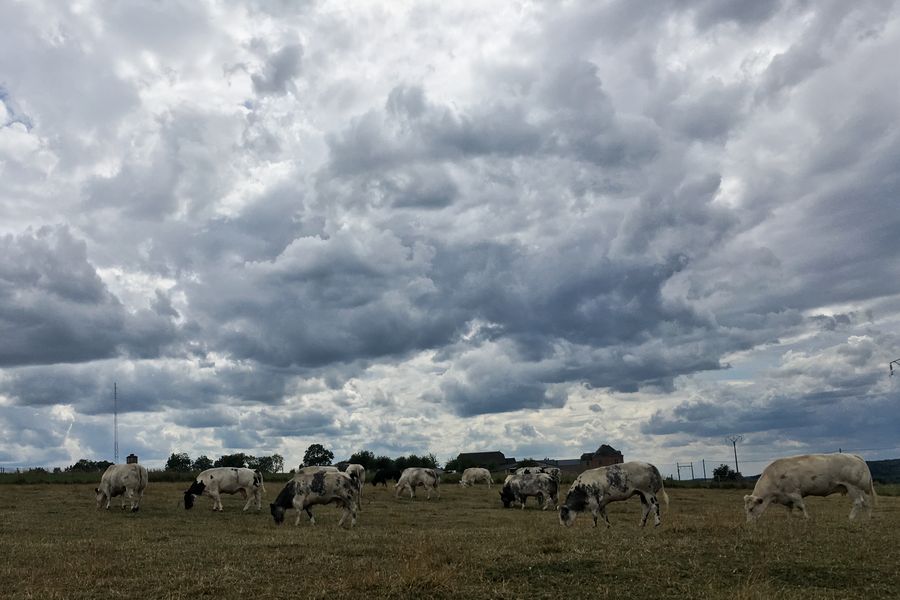
Cattle are seen at a farm near Waterloo in Belgium, July 20, 2019. (Xinhua/Zheng Huansong)
"AGGRESSIVE U.S. POLICY"
Beef trade frictions between the EU and the United States started two decades ago. After rounds of challenges and retaliatory tariffs, the two sides concluded an MoU in 2009, in which the EU pledged to set up a 45,000-ton quota of non-hormone treated beef to qualifying suppliers, including the United States.
However, the situation soon became less satisfactory for American farmers, as exports from other countries began filling up the quota. The United States was only managing to ship about 23,000 tons annually to Europe in some years, said Washington-based news outlet Agri-Pulse.
"The main reason for the unblocking of U.S. beef imports after 20 years is the aggressive U.S. policy," said Tolwinski, adding that Trump has "threatened" during his last Europe visit that he will retaliate against Germany's car industry, and France's cheese and wine.
"The U.S. definitely registered a political and economic success here. Polish farmers are losing, being hostages to the ill-thought and reckless international politics of its government, who is rather working in favor of the U.S. farmer than its own farmers," he said.
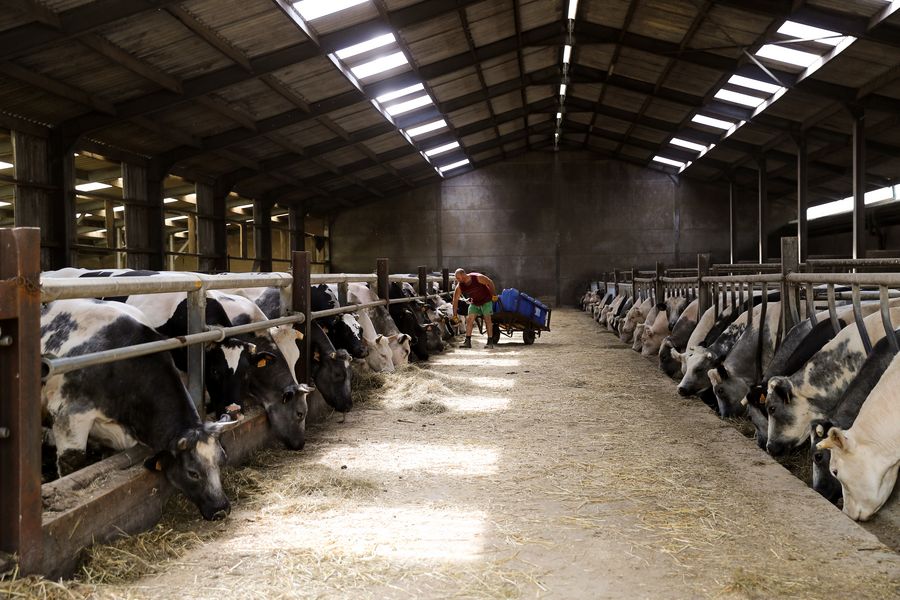
A man feeds Belgian Blue cattle at Philippe Saudoyez's farm in Merbes-Sainte-Marie, Belgium's Hainaut province, Aug. 12, 2019. (Xinhua/Zhang Cheng)
"The EU is increasingly making concessions at the expense of European farmers," Joachim Rukwied, president of the German Farmers Association, told German news agency DPA.
"We are very worried about this. Opening up the European market for the transatlantic import of agricultural goods is unjustifiable even in the context of the climate debate," Rukwied said, referring to the climate cost generated from increasing meat imports and exports.
(Video reporters: Han Chong, Zhao Yuchao, Pan Geping, Zhang Qi, Lian Zhen, Liu Xiaoming; Video editor: Liu Ruoshi)



